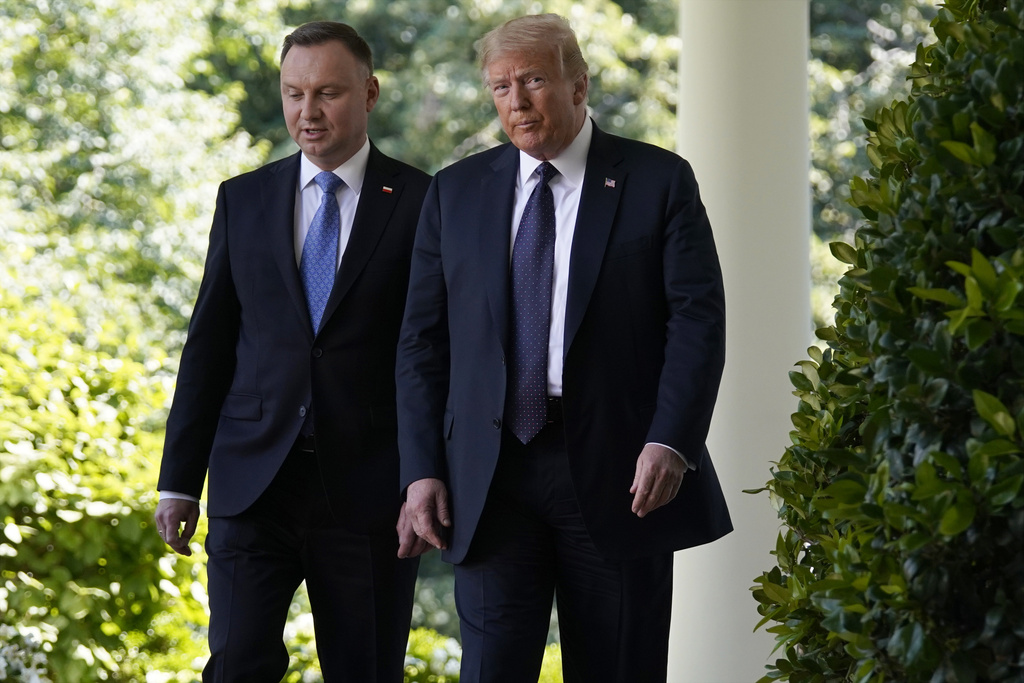Presumptive Republican presidential nominee Donald Trump is scheduled to meet Wednesday in New York with Polish President Andrzej Duda, a staunch supporter of Ukraine who once proposed naming a military base in his country “Fort Trump.”
The planned dinner meeting, confirmed by a person familiar with the matter, comes as European leaders prepare for the possibility that Trump might win the November election and return to the White House. Leaders of NATO countries are especially concerned given Trump’s long history of critical comments about the Western alliance, even after Russia’s invasion of Ukraine.
The person was not authorized to speak publicly and spoke on condition of anonymity.
Some in Poland fear the get-together could hurt the country’s relationship with the Biden administration while others welcome the prospect of Duda leveraging his friendly ties with Trump to make the case for backing Ukraine. NATO member Poland shares a border with Ukraine, and Duda, a right-wing populist whose term ends in 2025, has encouraged Washington to provide more aid to Kyiv to combat Russian aggression.
Trump has spoken out against such funding, but in a possible shift late last week, said he may support new money if it was in the form of a loan.
Duda, who was in New York for meetings at the United Nations, has long expressed admiration for Trump. When Duda was in a close reelection race in 2020, then-President Trump hosted him at the White House.
Trump is in New York this week for the beginning of his criminal hush money trial, which has dramatically limited his campaign movements. He is the first former president in U.S. history to stand criminal trial. Jury selection is set to resume Thursday.
Republicans in Washington are fighting amongst themselves over a foreign aid package for Ukraine, Israel and other allies. Trump’s “Make America Great Again” movement has been especially critical of the proposed assistance for Ukraine, a position in line with the GOP’s softening stance on Russia since Trump’s rise in U.S. politics.
Trump has long praised Russian President Vladimir Putin, calling his invasion of Ukraine “smart” and “savvy.” In February, Trump sent shockwaves across the globe after recounting during a rally that he had told NATO members that didn’t spend enough on defense that he would “encourage” Russia to “do whatever the hell they want” to them. He reiterated that threat days later.
Such a move would undermine Article 5, which states that an armed attack against one NATO member or more shall be considered an attack against all member
Poland’s centrist Prime Minister Donald Tusk, a political opponent of Duda, was critical of the visit with Trump. But Tusk expressed hope Duda would use it “to raise the issue of clearly siding with the Western world, democracy and Europe in this Ukrainian-Russian conflict.”
The socially liberal Gazeta Wyborcza daily said in a opinion piece that the visit “would be harmful and dangerous” because it would be interpreted as a Polish endorsement of Trump in the White House race and was a “slap in the face” of the Biden administration.
Duda’s favorable approach toward Trump has been a source of controversy in Poland, where fears of Russia run high and support for NATO is strong. Duda faced mockery for suggesting years ago that Poland could name a base “Fort Trump,” which did not happen. Duda was also criticized after Trump tweeted a photo after a 2018 meeting at the White House that some saw as showing Duda, and therefore Poland, in a subservient position.
Duda’s supporters argued for the value of speaking to those in and out of power in Washington.
“We need to talk to both sides of the political scene, especially since Donald Trump has a good chance of winning and these relations must be maintained,” Paweł Jabłoński, a former foreign minister who belongs to Duda’s conservative political camp, said in an interview with the Do Rzeczy news portal. “International politics is about having relationships with everyone and having them as good as possible.”
Another NATO member and key proponent of supporting Ukraine, British Foreign Secretary David Cameron, met with Trump at the former president’s Florida estate earlier in the month before a visit with Secretary of State Antony Blinken.
Hungary’s prime minister, Viktor Orban, an autocrat who has maintained the closest relationship with Russia among all European Union countries, met privately with Trump last month.
(AP)











